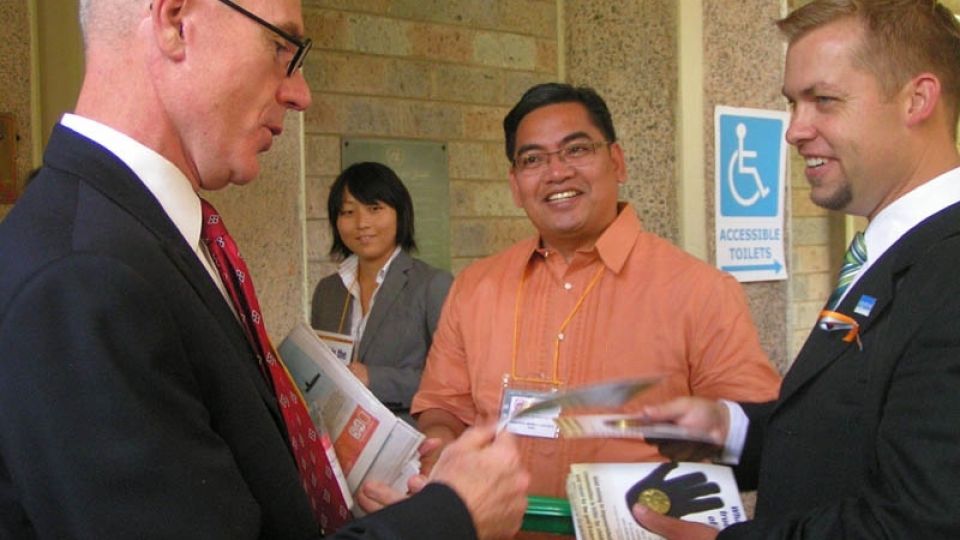Delegates from more than 120 countries in the recently-held third meeting of an intergovernmental negotiating committee (INC3) struggled to move forward on a global mercury treaty. Narrow cost considerations seemed to prevail over comprehensive obligatory provisions that fully protect human health and the environment from the toxic metal. Mercury can permanently damage the brain and kidneys and has been shown to affect a developing fetus, even months after the mother’s exposure.
Air emissions, including coal combustion represent one of the largest sources of mercury pollution. However, some countries insisted on weak voluntary obligations, provoking complete disagreement and blocking further action. All delegates said they supported protecting human health but could not even agree that all countries should address these sources through a national implementation plan.
“Delegates say they want to protect human health but narrow cost considerations seem to prevail,” said Manny Calonzo, IPEN co-chair. “The true cost mercury pollution and brain damage demands greater commitment and urgency.”
ASGM is the largest deliberate use of mercury but delegates were not sure if countries “should” or “shall” take action on the issue. The enormous mercury exposures from the activity provoked proposals to address public health concerns. However they were blocked by donor countries who
signaled cost concerns.
“Mercury exposure is not cheap, especially for children,” said Yuyun Ismawati of the Indonesia Toxics-Free Future Network and IPEN. “Thousands of children work in ASGM communities depriving them of their right to health and education. Gold mining in poor communities is sweet for gold traders but bitter for children.”
UN delegates inclined toward naming the treaty the Minamata Convention after the tragic poisoning of thousands in Japan due to a contaminated site. Despite this grim history, delegates agreed that no mandatory action should be required on contaminated sites.
“Of all the articles in the treaty, this one will be examined closely to see if governments are sincere in preventing future Minamatas,” said Takeshi Yasuma of the Citizens Against Chemicals Pollution (CACP), which is working with mercury pollution victims’ and survivors’ groups in Minamata, Japan. “It would be ironic to name the agreement ‘Minamata Convention’ if actions on contaminated sites are only voluntary.”
Yasuma’s disappointment was echoed by Jindrich Petrlik, from the Czech NGO Arnika and IPEN Heavy Metals Working Group. “Companies polluted these sites and they should pay for cleaning them up in line with the ‘polluter pays’ principle.”
IPEN and its participating organizations expressed hope that concerned governments would reconsider positions that tend to weaken the mercury treaty and ensure financial support for essential strategies and actions to combat mercury pollution, especially in poor and developing countries.
“We invite governments to join us in full commitment to formulating a strong treaty that will truly uphold the people’s right to health and healthy environment,” said Manny Calonzo, IPEN Co-Chair.
The INC in Nairobi is the third in a series of five meetings that will culminate in a diplomatic conference in 2013 to sign the treaty. The negotiation is being coordinated by the United Nations Environment Program (UNEP). The next INC will be held in Uruguay in June 2012. For more
information about mercury, please see:
https://ipen.org/toxic-priorities/mercury
Contacts:
Yuyun Ismawati, Indonesia Toxics-Free Network, IPEN lead for ASGM +44 75
83 76 87 07 Jindrich Petrlik, Arnika (Czech Republic), Co-chair for IPEN
Heavy Metals Work Group, +420 603582984 Takeshi Yasuma, Citizens Against
Chemicals Pollution (Japan), +81-3-5836-4358 Manny Calonzo, Co-Chair,
IPEN, +632-9178364691, This email address is being protected from spambots. You need JavaScript enabled to view it.







